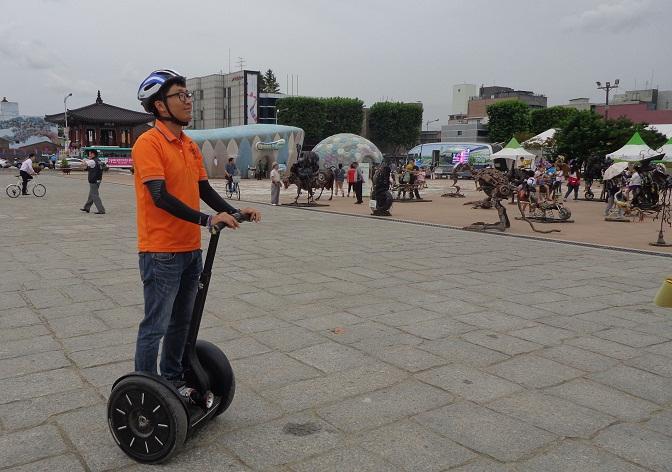ENGLISH
In Suwon, Give Up Your Car for A Month
"Try to imagine living without cars for just one month."

Suwon city in South Korea, is laying down a challange to its residents... to give up their cars for a month.
It is hoped that as air pollution levels decrease, resident’s quality of life will improve.
As I stepped foot onto Haenggun plaza, a man on Segway, an electronic scooter, came riding by.
He’s 29-year old Suwon resident Lee Seung-ryong.
“I like the Segway because it doesn’t use coal or oil. I think vehicles that run on electricity are much better for the environment. But walking is probably still the best way to get around.”
Lee is a volunteer at the Suwon Eco Mobility World Festival – the first of its kind.
The idea behind it is to show the world that you don’t really need cars to survive in a city.
And to do this, some parts of the Haenggun-dong neighborhood have been blocked off from motorised traffic for the entire month of September.
“The Eco-mobility world Festival project organized by ICLEI, UNHabitat and the city of Suwon,” says Katrina Borromeao, from one of the festival organisers, ICLEI – a Germany-based environmental NGO.
“We aim to get rid of cars, raise awareness amongst the citizens that a life without cars is possible.”
Locals are asked to park their cars outside the festival perimeter.
And the organiser provides residents with all sorts of bicycles and other foot-powered means of transportation.
“We talked to a lot of residents. Most said they don’t even know how to ride a bike anymore. They said they couldn’t imagine living without cars. We thought that if we are going to get them out of the cars, we need to offer them alternatives,” says Borromeao.
The concept of an Eco-Mobility Festival came from ICLEI’s Konrad Otto-Zimmermann.
He says he wants to give an example to urban leaders of how to envision the needs of a city 50 years into the future.
“So then I was developing the idea of staging such a city, like a piece of theatre. Just one month where in a real city, real citizens would play a future urban, greener life. And the idea is to stage an eco-mobile neighborhood for the world to see how that life might look like.”
He’s been selling the idea to various mayors around the globe for the past two years... but Suwon was the only taker.
“Yeah, it was very surprising because Korea is such a car-oriented society where people still strive to have a car in order to show their social prestige. In Europe some cities are very advanced in sustainable transport policies. So maybe they don’t think they need such an exercise in order to advance. They are already on a certain course,” he adds.
“I think in East Asia I think it’s important to have such a model neighborhood.”
After Suwon, Otto-Zimmermann says mayors from other global cities have expressed interest in holding the next Eco Mobility Festival.
Before the festival, the streets were run down, some roads were unpaved, others had pot-holes and cars were parked everywhere – clearly not pedestrian friendly.
At first, Suwon locals strongly opposed the idea of holding the festival here, says Mayor Yeom Tae-young.
“The residents of the neighborhood depend on their cars and business owners depend on customers to arrive by car. We really had to negotiate with them. For one and a half years there was constant opposition to the festival. They protested outside of City Hall, some even laid down in the construction site to block the redevelopment.”
But local government promised residents to give the whole neighborhood a facelift – the streets are now even and covered with slate stones.
And Mayor Yom Tae-young says the promise has won people’s heart.
I dropped into a few businesses along one of the closed off roads to see how locals feel about the festival now that it’s underway.
Hwang Hyun-ho owns the Haeng Gung Jang Tu restaurant. He says at first he was worried about his business, but after the renovations more people have been coming here and the neighborhood has become more vibrant.
Go Chang-ryong has been running a café in Haenggun-dong for around a year. He says the more foot traffic the better.
“Without cars, life is really more convenient now, there’s less noise and dust or illegal parking. I’m a bit worried what will happen to the neighborhood after the festival is finished.”
Mayor Yom Tae-young says he’s not sure if other cities can or should replicate exactly the Suwon Eco Mobility Festival.
But he says reducing imports of fossil fuels for a country like South Korea is an environmental and economic necessity. He adds that reducing dependency on cars is one way to accomplish that.
“We are living in a limited energy economy; I’m concerned there won’t be anything left over for the next generation. We have to get off fossil fuels, we need to prepare for the future and the festival could be a good model. Someone had to give this a try.”
Mayor Yeom says he’s not ready to call the festival‘s experiment a success yet.
Because when September ends, it’s up to the residents whether or not they go back to their old car driving ways.
- South Korea
- environment
- green city
- Segway
- Jason Strother
- eng
Komentar (0)
KBR percaya pembaca situs ini adalah orang-orang yang cerdas dan terpelajar. Karena itu mari kita gunakan kata-kata yang santun di dalam kolom komentar ini. Kalimat yang sopan, menjauhi prasangka SARA (suku, agama, ras dan antargolongan), pasti akan lebih didengar. Yuk, kita praktikkan!